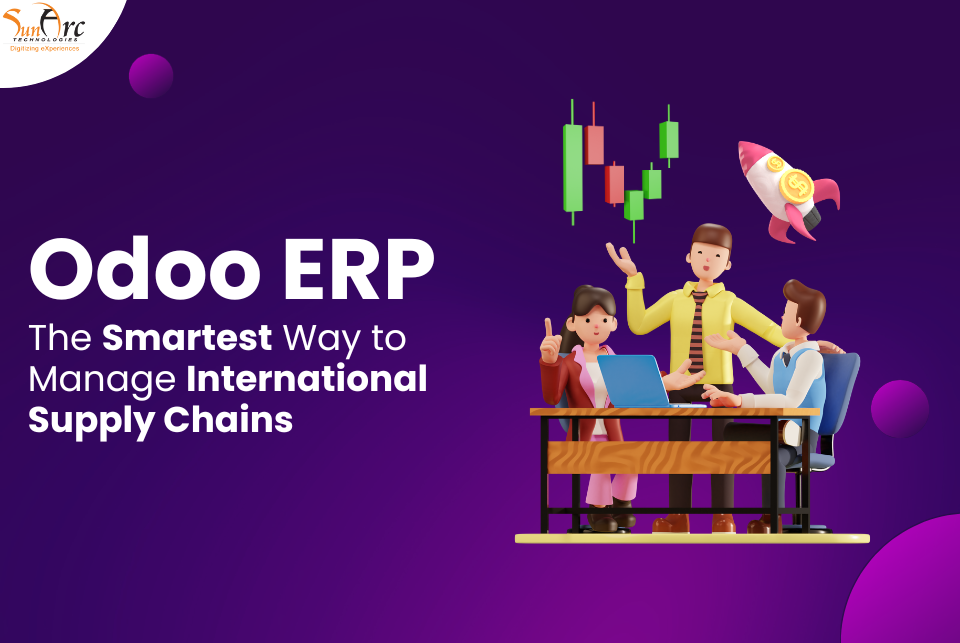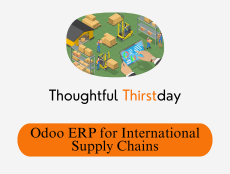If you’re running a trade business that deals with imports and exports, you already know how challenging it can be.
One moment, you’re dealing with customs regulations; the next, you’re hit with unexpected shipping costs or delays.
And let’s not even talk about the frustration of tracking supplier payments or missing inventory records!
The biggest problem? Lack of visibility.
Many trade enterprises struggle to get a clear, real-time view of their supply chain operations.
Where exactly is your shipment?
What hidden costs are eating into your profits?
Are your suppliers meeting delivery timelines?
If these questions keep popping up, it’s time for a change.
This is where Odoo ERP comes in. It’s not just another business software; it’s your all-in-one tool to simplify, automate, and streamline your entire international supply chain. Let’s break it down and see how Odoo ERP helps trade businesses like yours tackle these everyday challenges.

Challenges in International Supply Chain Management
Before we delve into how Odoo ERP can be your guiding light, let’s identify the common hurdles that trade enterprises face:
1. Regulatory Compliance: Each country has its own set of import/export regulations. Keeping up with these varying laws can be daunting, and non-compliance can lead to delays, fines, or even legal action.
2. Cost Management: Fluctuating tariffs, duties, and transportation expenses can make it challenging to maintain profitability. Without clear visibility, unexpected costs can catch businesses off guard.
3. Data Silos: When departments operate on disparate systems, information becomes fragmented. This lack of integration hampers real-time decision-making and creates inefficiencies.
4. Supplier Coordination: Managing relationships with suppliers across different regions requires seamless communication. Misalignments can lead to delays, quality issues, or increased costs.
Odoo ERP: Your Compass in the Supply Chain Labyrinth
Odoo ERP offers a suite of integrated applications tailored to address these challenges head-on:
1. Regulatory Compliance: Navigating the Legal Landscape
Odoo’s quality control management system ensures that your products meet international standards. By setting quality checks at various stages—receiving, in-process, and pre-shipment—you can ensure compliance with global regulations. This proactive approach minimizes the risk of non-compliance and associated penalties.
Example: A European food distributor used Odoo to implement stringent quality checks, ensuring all imported goods met EU standards. This not only prevented potential fines but also enhanced their reputation for quality.
2. Cost Management: Shedding Light on Expenses
With Odoo’s financial reporting and analytics, businesses gain real-time insights into expenses related to import/export activities. Detailed reports on tariffs, shipping costs, and duties enable you to identify areas where costs can be optimized. This transparency empowers informed decision-making and strategic planning.
Example: A textile importer leveraged Odoo’s analytics to uncover that air freight costs were disproportionately high. By switching to sea freight for non-urgent shipments, they reduced transportation expenses by 15%.
3. Data Integration: Bridging Information Gaps
Odoo’s centralized database ensures that all departments—from procurement to sales—operate on the same platform. This integration eliminates data silos, facilitating seamless information flow and real-time collaboration. The result is improved efficiency and a unified approach to decision-making.
Example: A consumer electronics company integrated their inventory, sales, and procurement departments using Odoo. This led to a 20% reduction in stock discrepancies and improved order fulfillment rates.
4. Supplier Coordination: Harmonizing Global Partnerships
Odoo’s supplier portal provides a dedicated platform where suppliers can access purchase orders, delivery schedules, and payment statuses. This transparency fosters trust and ensures that all parties are aligned, reducing the likelihood of misunderstandings and delays.
Example: An automotive parts manufacturer used Odoo’s supplier portal to synchronize production schedules with suppliers in Asia. This coordination reduced lead times by 25% and minimized stockouts.
Real-World Challenges: The Need for Odoo ERP
Recent global events have underscored the importance of robust supply chain management:
- Geopolitical Instability: Trade tensions and tariffs can disrupt supply chains, leading to increased costs and delays. For instance, recent tariffs have significantly impacted industries reliant on international trade.
- Regulatory Changes: New trade policies require businesses to adapt swiftly to remain compliant and avoid penalties.
- Supply Chain Disruptions: Events like natural disasters or pandemics can halt production and transportation, emphasizing the need for agile and transparent supply chain systems.
Odoo ERP Features Addressing Supply Chain Challenges
| Challenge | Odoo ERP Feature | Benefit |
| Regulatory Compliance | Quality Control Management | Ensures products meet international standards, reducing legal risks |
| Cost Management | Financial Reporting & Analytics | Provides transparency into expenses, aiding in cost optimization |
| Data Silos | Centralized Database | Facilitates seamless information flow across departments |
| Supplier Coordination | Supplier Portal | Enhances communication and alignment with global suppliers |
Conclusion
In the complex world of international trade, visibility is paramount. Odoo ERP is a ray of hope, guiding business enterprises through the complexities of global supply chain management. By solving challenges related to compliance, cost management, data integration, and supplier coordination, Odoo enables businesses to operate with clarity and confidence.
Do you also want that clarity and confidence? Switch to Odoo, Switch to the best Odoo developers, Switch to us.

